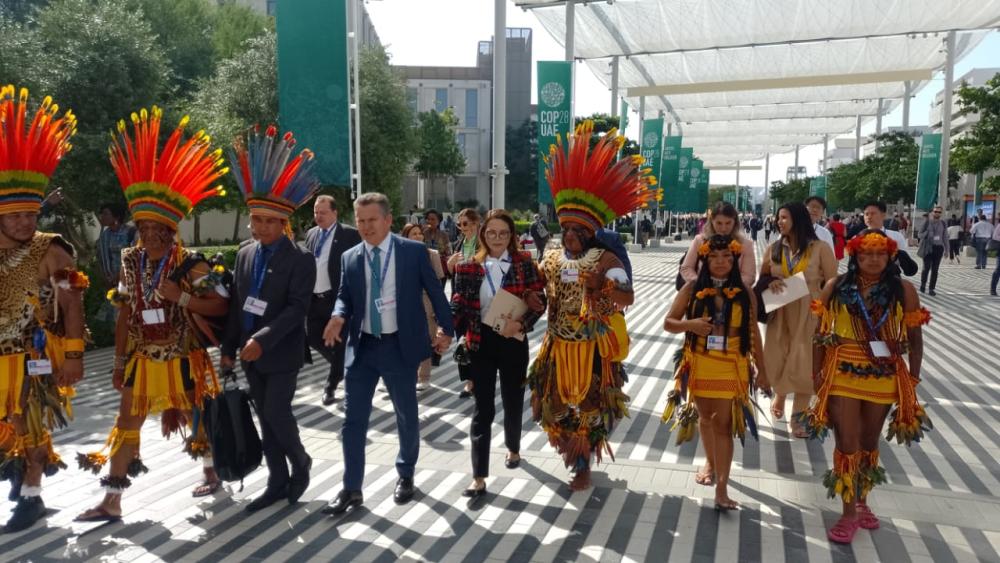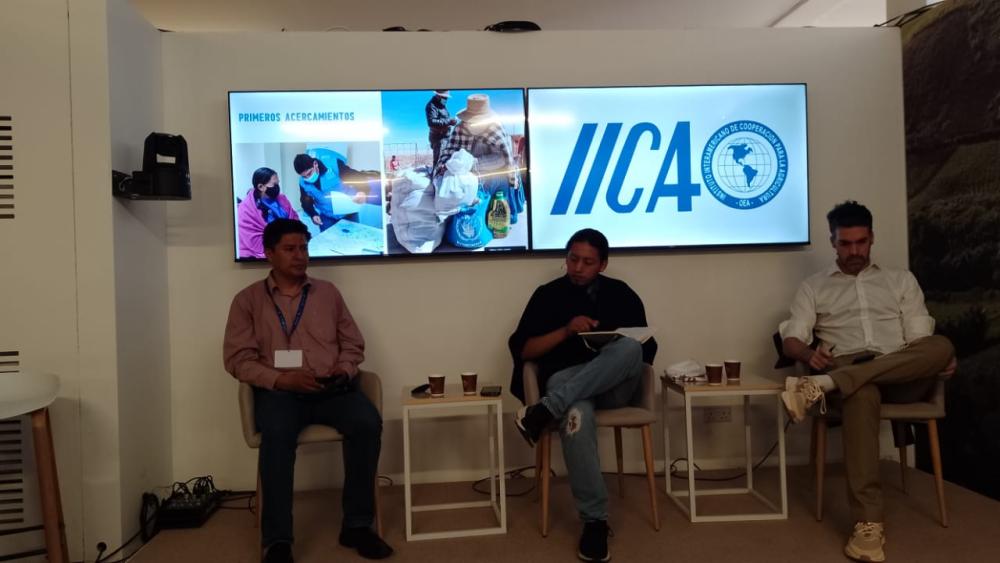In the IICA pavilion at COP28, Latin American and Caribbean indigenous peoples showcased the importance of ancestral knowledge in tackling climate change

Dubai, United Arab Emirates, December 7, 2023 (IICA). In the pavilion that the Inter-American Institute for Cooperation on Agriculture (IICA) is operating at the massively attended United Nations Climate Change Conference (COP28) being held in the United Arab Emirates, members of Latin American and Caribbean indigenous peoples showcased the importance of ancestral knowledge in building resilience to the environmental crisis affecting food security and their livelihoods.
The event took place at the Home of Sustainable Agriculture of the Americas, the pavilion that IICA, its 34 Member States, and strategic partners from the private sector are operating at Expo City in Dubai, where high-level discussions are taking place on the role of agriculture in the Americas in global mitigation and adaptation efforts.
The presentation, which attracted great interest at the world’s largest forum for climate change negotiations and debate, was organized jointly by IICA and the Fund for the Development of the Indigenous Peoples of Latin America and the Caribbean (FILAC), which promotes the development in harmony with the environment of the region’s indigenous peoples, communities and organizations.
Also taking part were representatives of the World Food Programme (WFP) and the International Organization for Migration (IOM), United Nations agencies that are implementing projects across the continent aimed at reducing the vulnerability of indigenous peoples to extreme weather events that impact the natural resources on which they depend for their livelihoods.
“We are promoting intergenerational dialogue. It is essential that our elders share ancestral knowledge with our young people to tackle climate change”, said Gabriel Cuatín Cuesta, a member of the Pasto people of Colombia, who traveled to Dubai from the Muellamues Reservation, in the department of Nariño.
Cuatín, who is a member of the Indigenous Youth Network of Latin America and the Caribbean, which coordinates the work of activists in 18 countries in the region, explained that indigenous peoples do not have an anthropocentric view of nature: “We and the territory are one. We’re fully integrated and that’s why we’re so affected by climate change. And we’re very active in developing productive projects in our territories that prioritize resilience”.
Impact on traditional systems
FILAC’s Roberto Salvatierra emphasized the obstacles that the region’s indigenous peoples face in accessing safe, nutritious food, due to the land lost as a result of large-scale extractive projects that destroy natural resources, lack of access to basic services, deforestation, pollution, and the loss of biodiversity affecting their traditional agrifood systems.
“In addition to the climate crisis, we encounter discrimination and marginalization in political and economic processes. Indigenous peoples are often not involved in decision-making, and for that reason our projects in partnership with IICA are very important”, Salvatierra said.
The event turned the spotlight on the case of the Urus, one of Bolivia’s indigenous nations, who have seen Lake Poopó dry up completely due to climate change, catastrophically impacting not only their livelihoods, but also their cultural identity.
Divha Gantier, from the World Food Programme, pointed out that the United Nations agency has implemented a project aimed at diversifying the livelihoods of the Urus, since traditionally they have lived off of the resources provided by the lake.
“Despite the adverse conditions, the Urus have shown great strength and determination. And women have been decisive agents of change, because when the men could no longer hunt or fish, they set up artisan associations that enabled them to generate income”, Gantier said.
The World Food Programme also provided the Urus with a drinking water system, because after Lake Poopó dried up, they began using poor quality well water that caused stomach illnesses.

All the actions implemented were agreed upon with the authorities and the members of the communities, who also strengthened their animal value chains and received training in new technologies to enable them to integrate into digital markets.
From the IOM’s perspective, the need to integrate the work with indigenous populations is also increasingly evident, explained Pablo Escribano, regional specialist in migration, environment and climate change.
“More than half of Latin America’s indigenous people live in urban areas and are constantly moving. Meanwhile, communities in rural areas are exposed to many climate threats, such as droughts in South America, sea level rises in Panama, hurricanes on the Central American coasts, and fires in many countries”, he said.
The specialist argued that the loss and damage fund approved at COP 27 should include funding for the displacement of indigenous people and their non-economic losses such as their cultural identity, traditions and involvement with the territory.
More information:
Institutional Communication Division.
comunicacion.institucional@iica.int